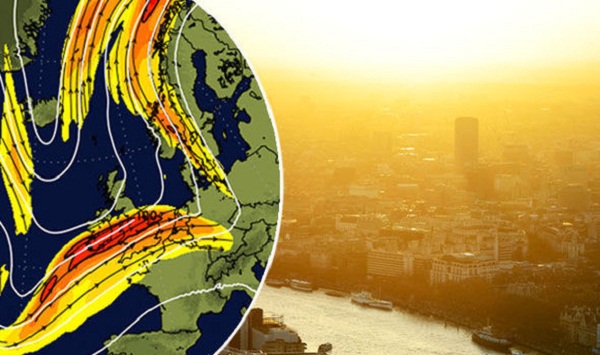From China in the east to the US in the west, the world is under the grip of scorching heat waves and catastrophic extreme weather events, according to Anadolu Agency.
The disasters unfolding are rooted in several reasons, not least the increasing impact of rising global temperatures – currently around 1.2 degrees Celsius (2.2 degrees Fahrenheit) above pre-industrial levels.
In May, the UN agency World Meteorological Organization issued a stark warning: the planet’s temperature will exceed the key threshold of 1.5C (2.7F) of warming for the first time within the next five years.
If that was not enough to set off all sorts of alarm bells, a leading British climate scientist now believes that continued “inaction” by governments and failures to meet critical climate pledges is putting the world on course to warm about 2.5C (4.5F), eclipsing the set climate goal by a full degree.
As countries continue to pump greenhouse gases into the atmosphere, the world’s temperature will keep rising, according to Robert Watson, emeritus professor at the UK’s Tyndall Center for Climate Research.
“That will lead to more extreme weather events – heat waves, floods, droughts, forest fires – just as we are seeing today, throughout Europe, North America and other parts of the world,” Watson, who previously held key positions at the UN, NASA and the White House, told Anadolu.
“Unless we stop putting greenhouse gases into the atmosphere, the world will continue to keep getting warmer and warmer, with more adverse consequences to human well-being and for nature.”
Last month was the hottest-ever June across the globe, 0.5C above the 1991-2020 average, shattering the previous record of June 2019 by a substantial margin, according to the EU’s Copernicus Climate Change Service.
Northwestern Europe saw record temperatures in June, while parts of Canada, the US, Mexico, Asia, and eastern Australia also sweltered in temperatures far above the normal.
The sizzling weather continued into July, toppling more records as southern Europe, parts of the US, China, and Mexico braved blistering temperatures above 45C (113F), triggering heat alerts and wildfires.
On July 3, the world experienced its hottest day as global average temperatures hit an unofficial record of 17.01C (62.61F), surpassing the previous high of 16.9C (62.42F) in 2016.
That was a short-lived record as July 6 saw global average temperatures reach 17.23C (63.01F), according to data from the University of Maine’s Climate Reanalyzer.
Over the past 20 days, average temperatures on the planet have been higher than any previous stretch on record.
July is now expected to be the warmest month “in modern history (and plausibly the past 120,000 years),” Michael Evan Mann, distinguished professor in the Department of Earth and Environmental Science at the University of Pennsylvania, said in a Twitter post.
“The July heat waves in Europe and North America would have been almost impossible without climate change,” according to an analysis published by World Weather Attribution (WWA) on Tuesday.
The analysis showed climate change made the recent heat wave in China at least 50 times more likely, while such events are no longer classified as unusual.
“Greenhouse gas emissions made the heat waves hotter than they would otherwise have been. The European heat wave was 2.5C hotter, the North American heat wave was 2C hotter, and the heatwave in China was 1C hotter because of climate change,” read the report by seven researchers, including scientists from universities and meteorological agencies in the Netherlands, the UK, and US.
Such extreme weather events will “become even more frequent, occurring every 2-5 years,” if the global temperature increase reaches 2C (3.6F), which is likely to happen in about three decades if the Paris Agreement signatories fail to honor their emissions pledges, the report warned.
According to Watson, the British climate scientist, governments around the world are not “even close” to their targets.
“While it may still be technically feasible to limit global warming to 1.5C or 2C, I do not personally see governments of the world are willing to commit to the emissions reductions … (or are) even close to the Paris Agreement goals,” he said.
He does not see the political will needed to halve emissions by 2030 and reach net-zero by 2050.
“Governments are not doing what is needed,” he added.
Watson underlined that countries have to “push really hard to get immediate reductions in greenhouse gases, and in the long-term to net-zero.”
He said governments must realize that tackling climate change would also best serve their economic interests.
“Many governments still say it will cost money to limit warming. But in reality, the cost of inaction is much more than the cost of action,” he emphasized.
“We need governments to work with the private sector and the public to make the changes that are needed,” he said, calling for comprehensive efforts for mitigation policies and adaptation strategies.
More about:
















































